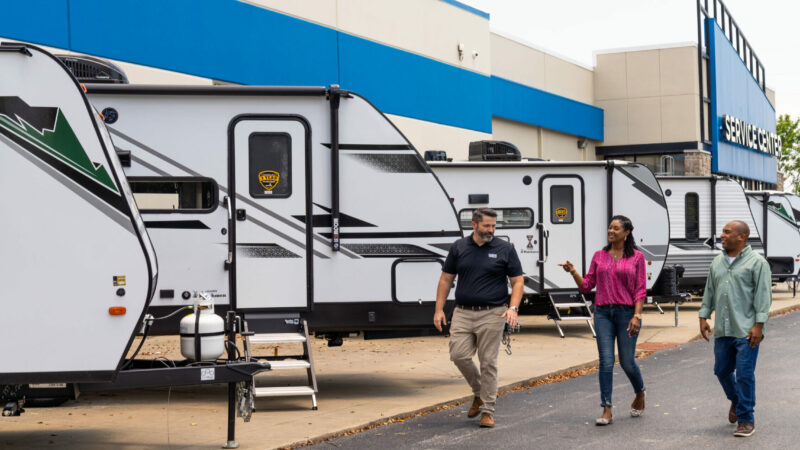RVIA e-RV Webinar: ‘More Power, More Storage, More Usage’

[embedded content]
The RV Industry Association (RVIA) hosted a webinar earlier this week on “e-RVs and the Impact on the RV Industry” (see video above), with the key takeaway being the RV industry as a whole is developing products and lobbying for the necessary infrastructure for the coming EV revolution.
Hosted by RVIA’s Monika Geraci, the webinar brought together five industry leaders to discuss the electrification of the RV industry and how it can best partner with the EV industry for a better customer experience.
The following RVIA members attended this hour-long panel discussion:
- McKay Featherstone, THOR Industries Senior Vice President of Global Innovation
- Ashis Bhattcharya, Winnebago Industries Senior Vice President for Business Development, Strategy, & Advanced Technology
- Toby O’Rourke, Kampgrounds of America, Inc. President and CEO
- Jay Landers, RV Industry Association Vice President of Government Affairs
- Bryan Ritchie, RV Industry Association Head of Standards
The RV industry is already working on many of the challenges as the U.S. transportation industry adopts electric vehicles, it was noted. The consensus is that RV customers will continue to demand more power, more storage and more usage.
Challenges include the following:
- More education and training is needed about clean energy as it relates to all vehicles including EVs and RVs, so that there’s a consistence message to customers from marketing, dealerships, maintenance and campgrounds.
- Production volume is still low, so e-RV prices are higher than existing technologies, but government incentives can help fill in the financial gaps until production scale reduces costs.
- Charging station location and Design is important to allow tow vehicles and trailers to charge without having to disconnect the trailer from the truck. In 5 years 20% of EV charging stations on the road should have pull-through and multi-vehicle charging designs.
- EV and e-RV charging at campgrounds is a challenge since existing pedestals aren’t suited for the continuous current requirements of charging 100kWh batteries. Most campground will need additional Level-2 chargers in common areas and a minimum percentage of EV chargers at the campsites. New campgrounds are being designed built for this challenge.
Many positive ideas were also discussed:
- Solar power is viewed as a refined technology, and will continue to grow.
- Lithium batteries are seen as the best solution for providing the customer with a great off-grid experience. Battery energy density will increase as costs continue to drop.
- All digital devices in an RV should able to communicate with each other and be controlled under a common Smartphone app so that customers don’t need to switch screens to control everything.
- Improved appliance efficiency is a manufacturing goal since that means more off-grid time with less batteries.
- The RV industry plans to become the best possible towing partner with the EV manufacturers, for example; by improving aerodynamics to help reduces the range loss of EV trucks like the Ford Lightning, and offer self-propelled e-RVs like the Airstream E-Stream trailer with on-board batteries and traction motors.
- The RV industry plans to start with smaller Class-B e-RVs ad using existing vehicle chassis that are already powered by Lithium batteries.
- Since many states have already legislated aggressive zero emission standards, some beginning as soon as 2030, the RV industry is ramping up the development of new products that can meet these deadlines while meeting customer expectations.
- Early EV adopters are already towing small RV trailers with EVs and it’s expected that in 10 years there would be a 50% rate of EV adoption by the public.
In all, the RV industry seems to be aware of the major challenges facing consumer adoption of e-RV technology, and is working closely with the federal government and vehicle manufacturers to help with the transition from fossil fuels to a renewable energy infrastructure.
Source: https://rvbusiness.com/rvia-e-rv-webinar-more-power-more-storage-more-usage/






